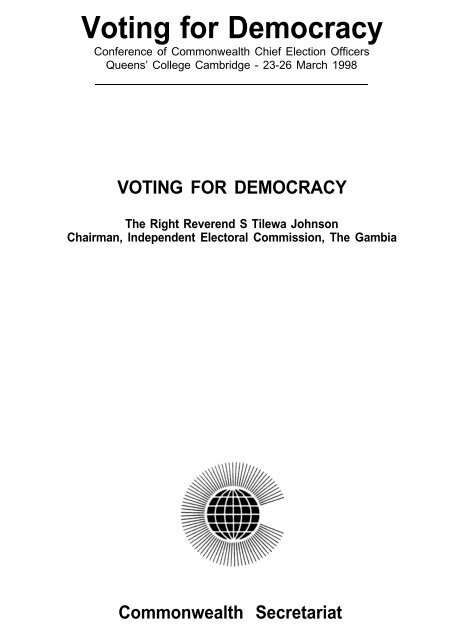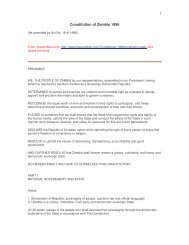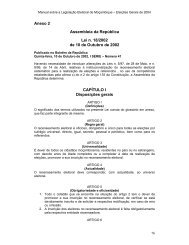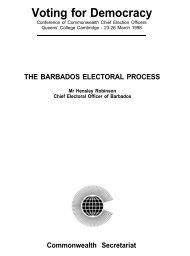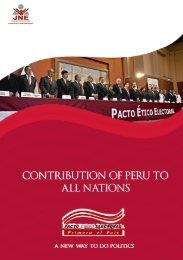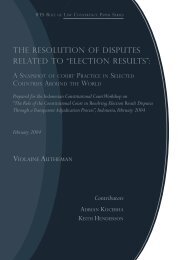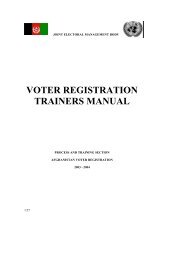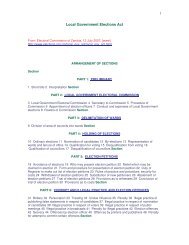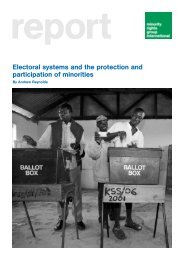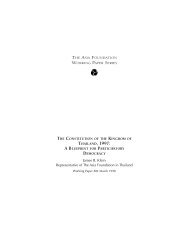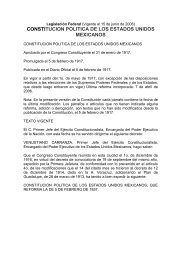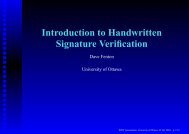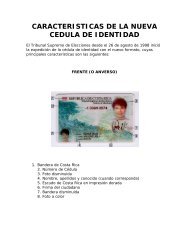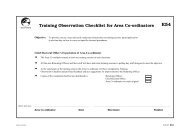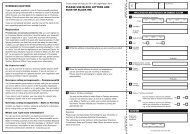Gambia: Getting the Register Right
Gambia: Getting the Register Right
Gambia: Getting the Register Right
Create successful ePaper yourself
Turn your PDF publications into a flip-book with our unique Google optimized e-Paper software.
Voting for DemocracyConference of Commonwealth Chief Election OfficersQueens’ College Cambridge - 23-26 March 1998VOTING FOR DEMOCRACYThe <strong>Right</strong> Reverend S Tilewa JohnsonChairman, Independent Electoral Commission, The <strong>Gambia</strong>Commonwealth Secretariat
VOTING FOR DEMOCRACYTHE STATE OF MODERN ELECTIONSIn two years, humankind will mark <strong>the</strong> advent of a new millennium. This maybe an opportune moment to reflect on <strong>the</strong> course of <strong>the</strong> twentieth century aswell as <strong>the</strong> challenges <strong>the</strong> next could pose. The manner in which nationschoose <strong>the</strong>ir leaders or representatives and hold <strong>the</strong>m to account during thisperiod was subject to numerous changes. The philosophy of laissez-fairewhich seemed to dominate <strong>the</strong> political arenas of Europe in <strong>the</strong> 19 th century,has apparently had an enormous influence on <strong>the</strong> basis upon which many of<strong>the</strong> substantive rights such as freedom of <strong>the</strong> press, freedom of associationand assembly and particularly <strong>the</strong> right to universal adult suffrage, wereincorporated into <strong>the</strong> fabric of modern constitutions. Procedural rightsthrough which governments are controlled were gradually sanctioned. Theprotection of <strong>the</strong>se rights has been a cornerstone of democratic thought andconstitutionalism since <strong>the</strong> American and French revolutions.Today, such features may be taken for granted but, a sober reflection willreveal that it is only fairly recently that universal adult suffrage was attained inmany of <strong>the</strong> established democracies and in most cases not without bitterstruggles. Such rights have always been subject to limitations. However,never before have <strong>the</strong>y been so much in conflict with <strong>the</strong> aims of governmentas in our age. As <strong>the</strong> responsibility of governments has ventured into manyareas formerly untouched by political authority, societies are challenged by<strong>the</strong> need to reconcile <strong>the</strong> rights of <strong>the</strong> individual with <strong>the</strong> needs of society.Such situations obtain in <strong>the</strong> new states that emerged in Africa and o<strong>the</strong>rparts of <strong>the</strong> world. From <strong>the</strong> attainment of independence, many Africannations have been concerned with <strong>the</strong> search for political consensus uponwhich, <strong>the</strong> foundation for traditional rights, which are central to <strong>the</strong> concept ofdemocracy, is based.In <strong>the</strong> course of <strong>the</strong> late twentieth century, <strong>the</strong> notions of democracy, free andfair elections and good governance have become established as globalnorms. Although <strong>the</strong>re exists no legal definition of democracy and, no globalconsensus over <strong>the</strong> political meaning of <strong>the</strong> concept, it is understood to be auniversal value, open to different legitimate interpretations an deriving fromvarious historical, cultural and political experiences of peoples around <strong>the</strong>world. To this end, democracy is an objective towards which states shouldaspire and less of a model government.Holding free and fair elections is a standard by which <strong>the</strong> legitimacy ofgovernments is judged. The choice of electoral system will vary dependingon <strong>the</strong> prevailing circumstances. At present, <strong>the</strong>re is a serious globalcommitment to elections. The number of electoral observer and internationalassistance missions undertaken in <strong>the</strong> 1990s bears testimony to this.1
International practice has established criteria against which <strong>the</strong> validity ofelections may be judged.The type of equipment used to conduct elections is a crucial factor in modernsystems. Fifty years ago, elections were conducted based on manualregisters. Today many countries maintain permanent electoral databases.Advances in computer technology are so great that equipment used for oneelection may be obsolete by <strong>the</strong> time ano<strong>the</strong>r is conducted. It is reasonableto infer <strong>the</strong>refore, that <strong>the</strong> financial implications of conducting an election arenot minor. In countries where permanent registers are not maintained, <strong>the</strong>costs of hiring people to conduct registration and o<strong>the</strong>r logistic matters involve<strong>the</strong> investment of financial resources. The calibre of personnel involved inmanaging elections is rapidly improving. Rolls of election managers aremaintained by a variety of international organisations and institutions. Theinternational dimension of modern elections has <strong>the</strong> potential to integratevariations in historical and cultural circumstance by making available anumber of alternative elements, which if appropriate to <strong>the</strong> local conditionswill enhance <strong>the</strong> administration of <strong>the</strong> process.Organising cost effective elections poses a major challenge to electionmanagers around <strong>the</strong> globe, more so, those operating in <strong>the</strong> newly emergedstates where funding is a major problem. However <strong>the</strong>re is no single solutionto <strong>the</strong> cost implications of conducting modern elections thus each case has tobe considered within <strong>the</strong> context of <strong>the</strong> specific social and political conditionsthat exist within a given country. We look forward with great anticipation to<strong>the</strong> sessions on <strong>the</strong> “cost of elections” scheduled for 25 March.THE ELECTION MANAGEMENT BODYThe authority to administer elections vests ei<strong>the</strong>r in a government official(Supervisors) or with special institutions created solely for this purpose. Thenature of <strong>the</strong> election management body depends on both <strong>the</strong> backgrounds ofits members and <strong>the</strong> mandate prescribed by law. Some bodies areresponsible for conducting all aspects of <strong>the</strong> electoral processes. In somecases however, o<strong>the</strong>r electoral matters e.g. <strong>the</strong> demarcation of boundariesare <strong>the</strong> responsibility of bodies (Boundary Commission) established to dealexclusively with such matters. Positions in <strong>the</strong> election management bodymay be filled in different ways. Two main approaches are:a) by appointing persons not affiliated to political partiesb) by appointing representatives of political partiesThese two approaches may have a heavy influence on <strong>the</strong> manner in which<strong>the</strong> election management body (EMB) operates. Where party representativesare appointed as members of <strong>the</strong> EMB <strong>the</strong> integrity of <strong>the</strong> process may bejeopardised. Although this may not always be <strong>the</strong> case impartiality will benear impossible to achieve. A much more constructive approach is <strong>the</strong>appointment of individuals who are not members of political parties. This is<strong>the</strong> approach adopted in The <strong>Gambia</strong>. The legal framework requires that for2
a person to qualify to be appointed a member of <strong>the</strong> independent ElectoralCommission (IEC) he/she must not be associated with any organisation thatsponsors candidates for election to a public office. Any person who isemployed by <strong>the</strong> Commission to perform any aspect of <strong>the</strong> Commission’soperations can qualify to contest an election only three years after. Suchmeasures in selecting <strong>the</strong> personnel for <strong>the</strong> EMB lays <strong>the</strong> foundation that willenhance <strong>the</strong> operational independence.The degree of independence accorded an EMB will depend on <strong>the</strong> systemoperating in any given country. In some countries as in The <strong>Gambia</strong> <strong>the</strong>basic principles of operations and <strong>the</strong> mandate of <strong>the</strong> EMB are provided for in<strong>the</strong> Constitution or some o<strong>the</strong>r act of <strong>the</strong> country’s law making body.In <strong>the</strong> <strong>Gambia</strong>, <strong>the</strong> Electoral Commission is guaranteed operationalindependence by Section 43 of <strong>the</strong> Constitution. This provision requires <strong>the</strong>Commission to be operated only on <strong>the</strong> basis of <strong>the</strong> law and should <strong>the</strong>reforenot be subjected to <strong>the</strong> direction of any o<strong>the</strong>r person or authority.The constitution also makes provision for a procedure for allocating fundsfrom <strong>the</strong> consolidated revenue fund. The IEC may raise funds provided thatsuch funds are not received from a political party.The degree of independence accorded to EMBs is of great concern in <strong>the</strong>newly emerged states of Africa. It is not possible to discuss <strong>the</strong>se matters ina paper of this nature but a couple of questions may be posed to providefood for thought. In cases where state officials whose work is related toelections are dismissed for acting against <strong>the</strong> wishes of <strong>the</strong> ruling party, whatappropriate course of action is open to <strong>the</strong> EMB? Will it be enough to saythat such matters should be followed through <strong>the</strong> normal Courts or will it befeasible to make provision for <strong>the</strong> EMB to apply for Judicial Review aninterested party?The relationship of <strong>the</strong> EMB with o<strong>the</strong>r state organs, <strong>the</strong> public and politicalparties is an important factor to be considered at this stage. In <strong>the</strong> emergingdemocracies, many are <strong>the</strong> instances have surfaced when genuine effortsgeared towards <strong>the</strong> establishment and maintenance of a credible electoralsystem are frustrated. This may be due to a number of factors. Two maingroups can be identified.The establishment of a new institution charged with <strong>the</strong> administration ofelections may pose a practical problem for many in that <strong>the</strong>re is insufficientknow how and experience in dealing with an independent constitutional entitysuch as an Electoral Commission. On <strong>the</strong> o<strong>the</strong>r hand, it must be admittedthat <strong>the</strong>re are cases when <strong>the</strong>re is lack of sufficient will and courage on <strong>the</strong>part of Electoral Commissioners to implement <strong>the</strong> requirements of <strong>the</strong> law.Perhaps <strong>the</strong> conference could come up with tips as to how <strong>the</strong>se possiblecauses of frustration could be dealt with.3
The EMB must always consult with <strong>the</strong> Political Parties as <strong>the</strong> mainorganisations in <strong>the</strong> electoral process. This has <strong>the</strong> advantage of ensuringthat many problems can be rectified before it is too late thus reinforcing <strong>the</strong>confidence that such organisations may have in <strong>the</strong> EMB’s ability to exerciseits mandate.GETTING THE REGISTER RIGHTAn election management body may register voters in various ways. Somecountries maintain permanent registers. O<strong>the</strong>rs (as was <strong>the</strong> case in Canada)compile a list of voters every time an election is called. This feature of <strong>the</strong>electoral system like <strong>the</strong> o<strong>the</strong>rs depends on prevailing socio-politicalconditions. There are financial implications to be considered as well asmethods of ensuring that <strong>the</strong> register is accurate and updated regularly.One of <strong>the</strong> most crucial factors in this area is ensuring that only eligiblepersons are registered. Most systems require citizenship as proof of loyaltyto enable one to be registered. Residency is also a prerequisite forqualification. Some countries however do grant citizens living abroad <strong>the</strong>right to register and vote in elections. This trend is on <strong>the</strong> increase. Howevermany systems do not grant such rights. It is presumed that citizens livingabroad are not very current on local conditions and <strong>the</strong>refore will not be in aposition to make appropriate choices.Where a permanent electoral register is maintained (as in Denmark), <strong>the</strong>re isa need to update <strong>the</strong> contents to keep abreast with changes in <strong>the</strong> society.This may be effected in <strong>the</strong> form of deletions, transfers, or additions.In some countries like <strong>the</strong> UK, registration is compulsory. Not all countrieshave this problem, as registration is optional. Whatever <strong>the</strong> method chosenmeasures aimed at protecting <strong>the</strong> integrity of <strong>the</strong> process must be introduced.In jurisdictions where records are properly kept <strong>the</strong> EMB is faced with anadditional problem. Where, however, records are not properly kept <strong>the</strong> EMBis faced with an additional problem.In The <strong>Gambia</strong>, voters are registered periodically at general andsupplementary registration exercises. Where an applicant cannot providedocumentary evidence such as a Birth Certificate as proof of citizenship, onemust obtain <strong>the</strong> attestation of five elders (registered voters) to testify that <strong>the</strong>person is a citizen of <strong>the</strong> <strong>Gambia</strong>.The greater part of <strong>the</strong> country does not have proper street addresses. In <strong>the</strong>urban areas, this problem is magnified due to <strong>the</strong> size of <strong>the</strong> settlements. In<strong>the</strong> past criticism has been levelled at <strong>the</strong> inability of <strong>the</strong> system to minimise<strong>the</strong> loopholes in <strong>the</strong> registration procedures. The regulatory frameworkmakes provision for <strong>the</strong> establishment of Revising Courts to hear any appealspertaining to <strong>the</strong> contents of <strong>the</strong> register. This implies that any applicantwhose claim is rejected may raise an objection to have his/her name included4
in <strong>the</strong> register. The IEC recently took measures to increase <strong>the</strong> checks in <strong>the</strong>procedures. Political Parties may appoint Registration Agents in accordancewith formalised rules, to observe <strong>the</strong> conduct of <strong>the</strong> supplementaryregistration of voters by <strong>the</strong> IEC. These agents may note any inconsistenciesand raise objections at <strong>the</strong> appropriate time.WHAT KIND OF ELECTIONS?Electoral systems are designed to ensure that <strong>the</strong>re is a fair representation of<strong>the</strong> people in <strong>the</strong> corridors of power. In The <strong>Gambia</strong> candidates are electedbased on first part <strong>the</strong> post, all public elections are based on single memberelectoral units (i.e. Constituency or Ward). The paraphernalia used onelection day to execute this preference of elections in unique. We areprobably <strong>the</strong> only country in <strong>the</strong> Commonwealth that uses ballot tokens tovote.CIVIL SOCIETY AND THE ELECTORAL PROCESSA sound electoral system depends not only on <strong>the</strong> existence of a properinstitutional framework but also on <strong>the</strong> acceptance and commitment of <strong>the</strong>electorate to <strong>the</strong> establishment and maintenance of a democratic system ofgovernment. Political and civil rights conventions are not establishedovernight but over a period. A number of factors may <strong>the</strong>refore influence <strong>the</strong>manner in which a certain phenomenon is accepted as a convention. TheMedia, Political Parties, and Election Observers are important players in <strong>the</strong>election ball game.Political parties pursue <strong>the</strong>ir objectives according to <strong>the</strong> legal provisionsregulating <strong>the</strong>ir activities. In The <strong>Gambia</strong>, <strong>the</strong>re are a number of criteria tomeet before <strong>the</strong> IEC, as <strong>the</strong> body responsible for <strong>the</strong> Registration of eligibleparties, issues a Certificate of Registration.Political parties are organisations through which people of <strong>the</strong> same politicalconviction associate. They provide an umbrella organisation that may contestfor <strong>the</strong> chance to determine <strong>the</strong> nature of <strong>the</strong> policies to be implementedwithin a particular state. In so doing, parties may nominate eligiblecandidates to contest an election. Sponsoring candidates at an electionrequire <strong>the</strong> investment of campaign funds.The manner in which such an objective can be achieved varies from countryto country. Some countries impose a maximum sum to be spent on electioncampaigns. In o<strong>the</strong>rs, <strong>the</strong> state provides funds. In <strong>the</strong> emerging democracies<strong>the</strong> provision of state resources for party activity is one of mixed blessing.Where a two party system operates <strong>the</strong> problems are limited. However, inmulti-party systems especially in countries with scarce financial resources thismay lead to <strong>the</strong> mushrooming of parties. The <strong>Gambia</strong> has a comprehensivesystem for regulating party financing which is yet to be tested. The IEC5
ecognises <strong>the</strong> need to embark on implementing <strong>the</strong> constitutional provisionsbut not before it has <strong>the</strong> sustainable capacity to do soIn <strong>the</strong> young democracies, parties may have a role to play in educating <strong>the</strong>ordinary person about <strong>the</strong> virtues of modern government. During <strong>the</strong> conductof elections or <strong>the</strong> registration of voters, political parties will canvas for votesor encourage <strong>the</strong>ir supporters to register but at <strong>the</strong> same time ensure that<strong>the</strong>ir supporters are adequately informed of what is required of <strong>the</strong>m. Suchactivities will complement any voter education programs that <strong>the</strong> EMB oro<strong>the</strong>r non-governmental organisations may implement.The media is an important channel through which EMB and political partiestransmit <strong>the</strong>ir respective messages to <strong>the</strong> electorate. The functions of <strong>the</strong>different media are regulated based on principles enshrined in <strong>the</strong>Constitution. Laws guaranteeing freedom of expression as well as <strong>the</strong>presence of an independent media are central to <strong>the</strong> idea of a free and fairelectoral system.In many developing countries, <strong>the</strong> state owned media usually has moreresources at its disposal than <strong>the</strong> private sector. There must be a levelplaying field so that all candidates contesting an election have a reasonableopportunity to publish <strong>the</strong>ir programs. This is evident in <strong>the</strong> amount of airtimeto each candidate during an election campaign.The approach to this problem varies. Some systems require <strong>the</strong> EMB toprovide an equal distribution of airtime whilst o<strong>the</strong>rs call for an equitabledistribution of airtime. The former does not pose much of a problem. Thelatter however may require consideration of a number of factors such as <strong>the</strong>number of seats won by that party at previous elections and <strong>the</strong> number ofcandidates nominated to contest <strong>the</strong> current one.In The <strong>Gambia</strong>, <strong>the</strong> IEC has <strong>the</strong> mandate to regulate use of <strong>the</strong> privatemedia. It also has formal powers to regulate <strong>the</strong> use of <strong>the</strong> public media.During <strong>the</strong> conduct of <strong>the</strong> National Assembly elections, <strong>the</strong> IEC established aReview Panel and a Committee of Eminent Persons. The panel had <strong>the</strong>mandate to preview political broadcasts recorded by candidates. Where anyparty or candidate believed that <strong>the</strong> contents of a particular recording was notin line with <strong>the</strong> media guidelines for candidates he/she may file an objection.Only candidates contesting in a particular constituency could preview tapes ofo<strong>the</strong>r candidates in that constituency, ei<strong>the</strong>r <strong>the</strong>mselves or through arepresentative.The Committee of Eminent Persons was established to decide on anyobjections raised by <strong>the</strong> Review panel.These ad-hoc measures were necessary to ensure that <strong>the</strong> content of <strong>the</strong>political messages broadcast by candidates were in line with <strong>the</strong> law andCode of Conduct for political parties.6
The Elections Decree makes provision for <strong>the</strong> IEC to provide candidates wi<strong>the</strong>qual access to <strong>the</strong> public media.Although elections are conducted based on <strong>the</strong> right of every nation todetermine its destiny, states have accepted by way of obligation, <strong>the</strong>observation by foreign nationals, all aspects of <strong>the</strong> electoral process. The<strong>Gambia</strong> is no exception. International observers were present during <strong>the</strong>conduct of <strong>the</strong> Presidential and National assembly elections. Local observersrepresenting international bodies also took part. The comments made by<strong>the</strong>se observers were helpful to <strong>the</strong> Commission, in particular, <strong>the</strong> ProvisionalIndependent Electoral Commission (PIEC) <strong>the</strong> predecessor of <strong>the</strong> IECestablished in December 1995 to oversee <strong>the</strong> electoral processes during <strong>the</strong>transition. The PIEC’s mandate ended in April 1997.Local observers have <strong>the</strong> opportunity to observe <strong>the</strong> process for a longerperiod. Besides <strong>the</strong>y are familiar with local conditions and <strong>the</strong>refore will find iteasier to understand current events. International observers spend a limitedperiod in countries where observer missions are undertaken, arriving almostat <strong>the</strong> end of <strong>the</strong> campaigns and leave almost immediately after <strong>the</strong> poll.Therefore, <strong>the</strong>re is a need to improve <strong>the</strong> capacity of local observers,possibly, by training <strong>the</strong>m toge<strong>the</strong>r with persons selected as polling orregistration staff.THE VOTERS PERSPECTIVEElections are a means of ensuring that a nation chooses its representativesbased on clearly defined pro-democratic rules. In this process politicalparties, government institutions and <strong>the</strong> media play vital roles. The voter isequally important. After all, <strong>the</strong>se people at <strong>the</strong> end of <strong>the</strong> day determine <strong>the</strong>persons eligible to occupy a political office. In so doing, a certain standard ofbehaviour as well as conformity to <strong>the</strong> established procedure is expected of<strong>the</strong>m. The level of a voter’s perception of what is right and what is wrong willdepend on a number of factors.In developing countries, where <strong>the</strong> official language is of European origin, <strong>the</strong>average literacy level is generally low. The EMB must <strong>the</strong>refore designappropriate methods to inform voters of <strong>the</strong> important aspects of <strong>the</strong> process.Voter Education is now accepted as an integral component of <strong>the</strong> electoralprocess. The voter is seen as a consumer of a service. One that providesreasonable access to polling stations, information on what is expected of <strong>the</strong>voters as well as <strong>the</strong> prohibitions and safeguards built into <strong>the</strong> system.In The <strong>Gambia</strong>, <strong>the</strong> IEC designed and implemented voter educationprogrammes. These took into account <strong>the</strong> various languages spoken in <strong>the</strong>country, <strong>the</strong> procedures nominating candidates, voting on polling day and <strong>the</strong>need to boost and maintain public confidence in <strong>the</strong> process. The programs7
also catered for informing women of <strong>the</strong>irparticular target group for enlighten ment.rights.The disabled were also aTRAINING AND TECHNOLOGYTechnological advances have influences every aspect of our existence. TheElectoral system is no exception. Mention has been made of <strong>the</strong> use ofcomputers in <strong>the</strong> registration process.In The <strong>Gambia</strong>, votes are cast by means of inserting a ballot token into aballot drum. A drum painted in <strong>the</strong> colour of <strong>the</strong> political party of eachcandidate is provided for each polling station within <strong>the</strong> electoral unit wheresuch a candidate is nominated. Counting is effected with specially designedcounting trays.Criticism has been levelled at <strong>the</strong> use of such equipment for being tooexpensive. A drum has to be provided for each nominated candidate. Wherea large number of candidates are nominated, <strong>the</strong> financial implications arehigh. This is not withstanding <strong>the</strong> IEC intends to continue with this uniquemethod of voting for two reasons:a) <strong>the</strong> ballot equipment is one of <strong>the</strong> most suitable for voting by nonliteratevoters;b) <strong>the</strong> ballot drums are manufactured locally. The technology is <strong>the</strong>reforesustainable.The drums may be fitted with electronic counters to so speed up <strong>the</strong> countingprocess.Training election personnel can be expensive. There is a need to trainwhenever an activity is being conducted. This is <strong>the</strong> case where <strong>the</strong> processis constantly subject to improvements. Not all <strong>the</strong> people engaged duringelection time are retained by <strong>the</strong> EMB on a permanent basis. Whatimplications does this have for <strong>the</strong> type of training? It is often said that anacademic discipline such as elections does not exist. This may be a truereflection of <strong>the</strong> current state of affairs. However, <strong>the</strong> seriousness with which<strong>the</strong> international community in general and our individual nations in particularapproach this issue may justify <strong>the</strong> development of an appropriate curriculum.Election management is becoming a profession and as such <strong>the</strong>establishment of permanent EMB responsible for <strong>the</strong> conduct of all publicelections may require a reconsideration of <strong>the</strong> role such professionals play in<strong>the</strong> democratic process. These are persons whose moral fortitude and senseof fair play are utilised to ensure that only <strong>the</strong> candidates who represent <strong>the</strong>will of <strong>the</strong> people are given <strong>the</strong> responsibility to lead <strong>the</strong>ir communities.The future looks promising for democracy and <strong>the</strong> electoral systemsparticularly in Africa. The emphasis states have placed on <strong>the</strong> establishmentof credible electoral systems in <strong>the</strong> 1990s has gone a long way in rebuildingconfidence that developing states have acceptable formulae to maintain <strong>the</strong>irsocieties on <strong>the</strong> basis of a political consensus.8
The achievements made in <strong>the</strong> past should not lead to complacency. Thusfar, only <strong>the</strong> foundations for viable democratic systems are being laid. Thetest for Election Managers will be <strong>the</strong> ability to adopt to <strong>the</strong> numerouschanges that may take place in society. The choice of <strong>the</strong> electoral systemhowever will depend on <strong>the</strong> historical and political factors in a given country.


